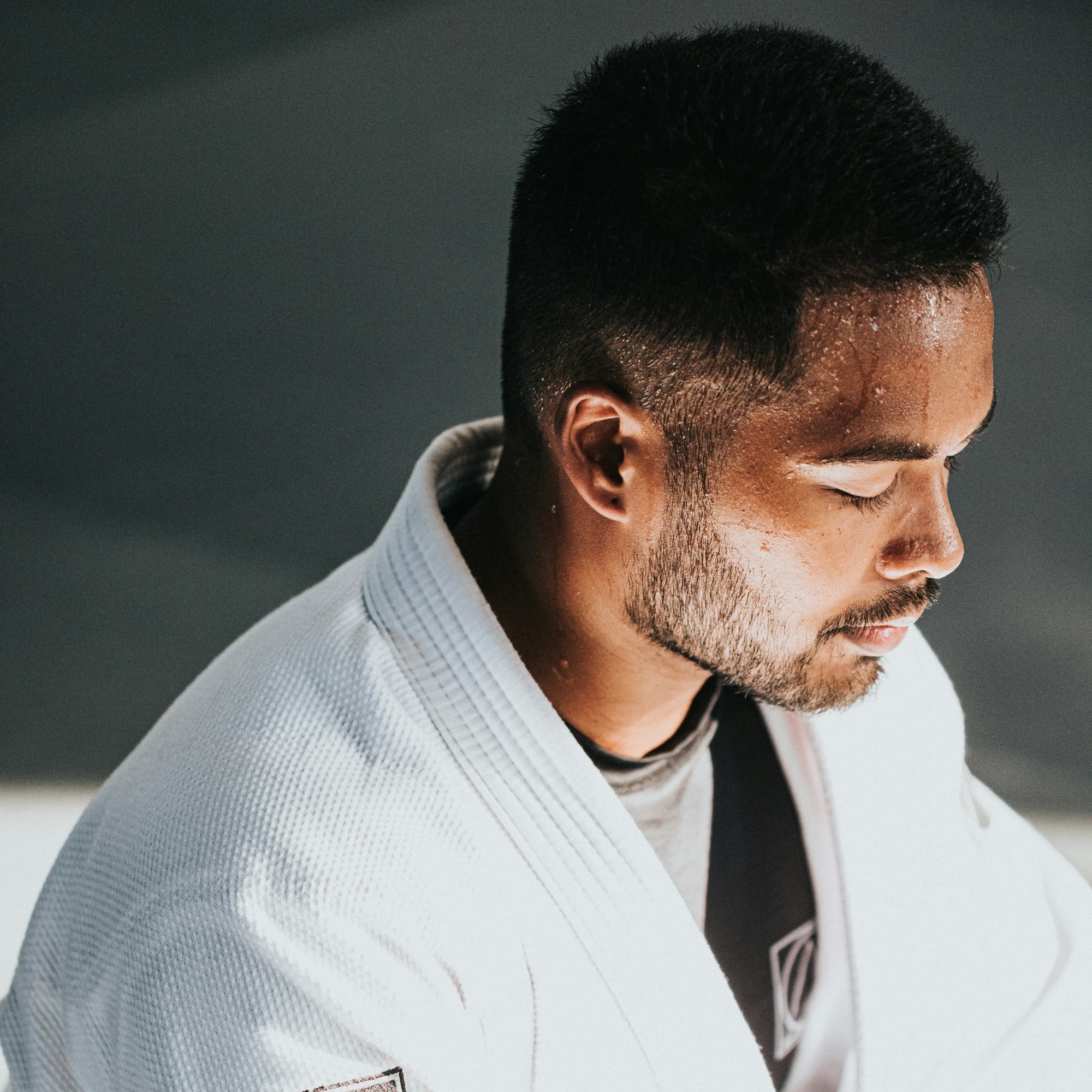You’ve drilled uchi-mata a thousand times. Your legs twitch with anticipation. But on competition day, standing mat-side, sweat already beading on your brow, your mind blinks. Not fear—something colder: doubt. You grip the gi, but your thoughts don’t follow.
Can mastering your mind be just as critical as mastering your technique?
If you’ve ever faced a match where your legs felt ready but your thoughts betrayed you, you’re not alone. While judo demands explosive physicality and crisp technique, elite competitors—and increasingly, science—argue that mental conditioning may be just as important. Recent studies and the experiences of legends like Teddy Riner suggest that your psychological toolkit could be the difference between ippon and implosion.
Let’s dive into how psychological factors like anxiety, resilience, and self-management influence performance on the tatami—and what you can actually do about it.
In this NotebookLM podcast episode, we talk about the psychological aspects of judo athletes' performance, highlighting the importance of mental fortitude in competitive sport. One academic paper examines how psychological function, self-management, and tension influence sports coping skills in judo athletes, concluding that self-management acts as a mediator regulated by tension.
⸻
Teddy Riner Doesn’t Just Train His Throws
When a 10-time world champion like Riner says, “Mental strength is equally crucial as physical and technical skills,” people listen. Riner, who’s worked with a sports psychologist since age 14, doesn’t just believe in the value of mental training—he sees it as inseparable from his judo preparation.
His approach reflects a growing consensus in research: athletes need a holistic training model that weaves together physical, technical, nutritional, and psychological elements.
Judo’s not just a fight of bodies. It’s a clash of composure.
⸻
Self-Management: The Real Kumi-Kata for Your Mind
What does self-management mean for judoka? It’s not about rigid discipline or daily journaling—it’s the ability to regulate your body, emotions, and focus across training and competition. According to Kim et al. (2022), judokas with strong self-management skills are more likely to:
• Enter matches with better mood states.
• Use setbacks as feedback rather than failure.
• Adapt more fluidly under stress.
Think of it like this: just as you grip your opponent’s gi to control the match, self-management is your invisible grip—the hold you keep not on your opponent, but on the moment.

⸻
Just ask Mai, a 21-year-old collegiate judoka from Tokyo, who nearly quit the sport after freezing mid-match at nationals. “I couldn’t feel my hands,” she said. “It wasn’t fear of losing—it was the pressure to prove I belonged.” Her breakthrough didn’t come from more drills, but from sessions with a sports psychologist who helped her reframe performance stress as fuel.
For a raw, real-world look at this mindset in action, check out “How I Deal With Failures & Overcoming Obstacles”, where Olympian Travis Stevens unpacks his personal struggles with defeat and how he rebuilt his mental approach. It’s a compelling reminder that mindset isn’t abstract—it’s lived.
⸻
Tension Isn’t the Enemy—If You Know How to Handle It
Most of us try to avoid tension. It’s uncomfortable. But in judo, tension is inevitable—and surprisingly, it can be useful.
Research shows that athletes with high self-management can convert tension into sharper focus and better decision-making. In fact, the more tension they felt, the more their coping skills improved—as long as their mental game was strong.
This flips the script: instead of fearing nervousness, athletes can train to ride it.
Think of it like Formula 1: top drivers don’t avoid redline RPMs—they train to operate inside that chaos. Judo’s the same. The mental accelerator matters as much as the brake.
Former national-level competitor and coach Shintaro Higashi speaks to this in “The Mental Side of Judo”, reflecting on how mental training has shaped his ability to navigate the high-pressure moments. His calm, practical tone makes these concepts accessible and directly applicable for anyone training judo seriously.

⸻
Psychological Capital: Your Inner Dojo of Hope and Grit
Psychological capital isn’t just jargon. It’s a well-defined set of traits—hope, optimism, resilience, and self-efficacy—that act like psychological armor. In a study of collegiate judo athletes (Lee et al., 2022):
• High psychological capital predicted better performance.
• It buffered the effects of anxiety.
• And yes—it can be trained.
This is potent. Your mental game isn’t pre-written—it’s sculpted, rep by rep, like muscle under tension. Like Mai, athletes with high resilience often rebound not just faster, but smarter.

⸻
The Sport Psychology Debate: Snake Oil or Secret Weapon?
Not everyone is convinced. BJJ coach John Danaher has called sports psychology a “scam industry,” claiming real confidence only comes from hard-earned success. But Riner’s long-term results—and a stack of peer-reviewed studies—suggest otherwise.
Further Reading: Davis, J. (2024) Teddy Riner: Mental preparation is as vital as physical and technical preparation for high level competition. 25 September 2024. Available at: https://bjjdoc.com/2024/09/25/teddy-riner-mental-preparation-is-as-vital-as-physical-and-technical-preparation-for-high-level-competition
This debate reveals a deeper question: Is confidence built or born? If it’s trainable, then mental preparation deserves the same respect as technical drills. If not, we might be missing a critical edge.
If you asked Danaher, he might say Mai just needed more randori. But her comeback proves otherwise.
Takeaways for the Tatami
• Self-management fuels performance—especially under stress.
• Tension can boost your game—if you’ve developed the skills to harness it.
• Psychological capital (hope, resilience, etc.) buffers anxiety and enhances outcomes.
• Anxiety isn’t always bad—it’s how you interpret and respond to it that matters.
• Mental training isn’t optional—for serious athletes, it’s foundational.
Final Thought
If your next breakthrough on the tatami isn’t about technique, but about mindset—how would you start training differently tomorrow?
Quiz: What is psychological capital in the context of judo performance?
A) The number of hours an athlete spends in mental training
B) A set of traits including hope, optimism, resilience, and self-efficacy
C) A mental fatigue threshold that affects performance
D) A financial investment into psychological coaching
Answer
Correct Answer: B) A set of traits including hope, optimism, resilience, and self-efficacy
Explanation: Psychological capital refers to a cluster of developable traits—hope, optimism, resilience, and self-efficacy—that help athletes buffer anxiety and perform better under pressure
(1) Lee, Ting-I & Wang, Ming-Yueh & Huang, Bo-Ruei & Hsu, Chi-Yueh & Chien, Chun-Yu. (2022). Effects of Psychological Capital and Sport Anxiety on Sport Performance in Collegiate Judo Athletes. American journal of health behavior. 46. 197-208. 10.5993/AJHB.46.2.9.
(2) Kim, Hye-Young & Chung, Eun-Jung & Kim, Sang-Woo & Lee, Byoung-Hee. (2022). Effect of Judo Athletes’ Psychological Function on Sports Coping Skills: Moderated Mediating Effect of Tension. International Journal of Environmental Research and Public Health. 19. 6634. 10.3390/ijerph19116634.
(3) Davis, J. (2024) Teddy Riner: Mental preparation is as vital as physical and technical preparation for high level competition. 25 September 2024. Available at: https://bjjdoc.com/2024/09/25/teddy-riner-mental-preparation-is-as-vital-as-physical-and-technical-preparation-for-high-level-competition





Member discussion: